The good surprise is
that we get into the minibus and when we are about to leave, Sandeepa comes
with us with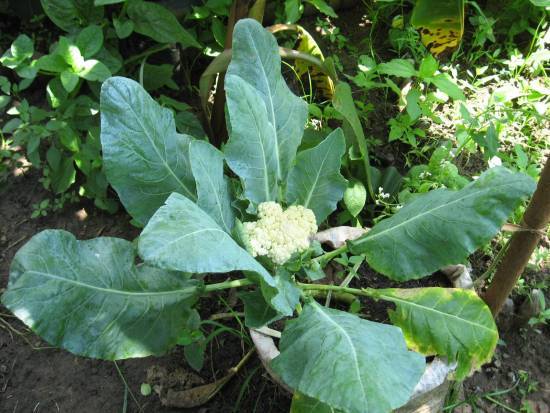 the members of the CCF. Thus it’s all together that we go and
visit some sites where they are very active. No need to tell you that we are
very pleased to spend a few moments more with Sandeepa. First we go to a home
gardening. It’s a place where they grow various young plants which will be
given later to the inhabitants. A kind of plant nursery. Kumara shows me more
particularly the network of “sprinkler” which waters the place. We discover of
course a great number of local species but also tomatoes growing here and there
and even a cauliflower young plant with leaves only, a luxury product in this
country. The families who benefit by this place take care of it and take part
to the apprenticeship of the techniques of growing and watering. It’s the
principle of the help brought by the CCF. The aim is to help people with a
technical and financial support. By no means there is a kind of nannying, of
direct assistance without people taking an active part in it.
the members of the CCF. Thus it’s all together that we go and
visit some sites where they are very active. No need to tell you that we are
very pleased to spend a few moments more with Sandeepa. First we go to a home
gardening. It’s a place where they grow various young plants which will be
given later to the inhabitants. A kind of plant nursery. Kumara shows me more
particularly the network of “sprinkler” which waters the place. We discover of
course a great number of local species but also tomatoes growing here and there
and even a cauliflower young plant with leaves only, a luxury product in this
country. The families who benefit by this place take care of it and take part
to the apprenticeship of the techniques of growing and watering. It’s the
principle of the help brought by the CCF. The aim is to help people with a
technical and financial support. By no means there is a kind of nannying, of
direct assistance without people taking an active part in it. 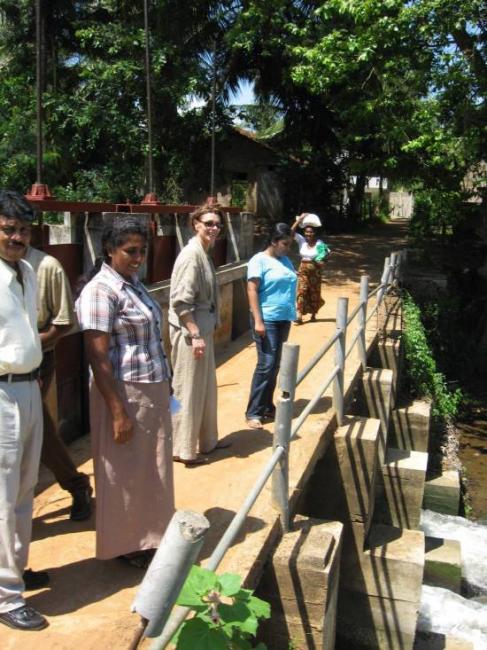 We set off again
for a few hundred metres towards a dam financed by the CCF, on the river
Kirinda. Hemali and Kumara tell me that thanks to this dam, 400 families have
access to irrigation water. At present the floodgates are wide open following
the recent important rains. The next visit is devoted to a family composed of
the mother and her three daughters. Her situation is critical because her
husband is dead and her brother who is a soldier and supported her, has just
been seriously wounded and must have an amputation. Everybody is moved when
hearing this tragedy. The older daughters, just back from school, show their
uniforms proudly: white dress and blouse, red tie. The oldest wears a medal she
got thanks to her fifth rank. Their house is not finished and they with the
grandmother. A long silence follows the explanations translated by Srath. The
mother holds her tears back when telling about her brother’s wound, meaning the
end of his financial help. Despite all her efforts she doesn’t manage to find a
permanent job because of her lack of professional training, of means of
transport ,of opportunities in this part of the country, of everything in fact.
We can see in her eyes a call for help her dignity prevents her from saying
loud. I feel uncomfortable, of course we could help this family too but how
many of them are in the same situation? Several ten or hundred thousands
probably.
We set off again
for a few hundred metres towards a dam financed by the CCF, on the river
Kirinda. Hemali and Kumara tell me that thanks to this dam, 400 families have
access to irrigation water. At present the floodgates are wide open following
the recent important rains. The next visit is devoted to a family composed of
the mother and her three daughters. Her situation is critical because her
husband is dead and her brother who is a soldier and supported her, has just
been seriously wounded and must have an amputation. Everybody is moved when
hearing this tragedy. The older daughters, just back from school, show their
uniforms proudly: white dress and blouse, red tie. The oldest wears a medal she
got thanks to her fifth rank. Their house is not finished and they with the
grandmother. A long silence follows the explanations translated by Srath. The
mother holds her tears back when telling about her brother’s wound, meaning the
end of his financial help. Despite all her efforts she doesn’t manage to find a
permanent job because of her lack of professional training, of means of
transport ,of opportunities in this part of the country, of everything in fact.
We can see in her eyes a call for help her dignity prevents her from saying
loud. I feel uncomfortable, of course we could help this family too but how
many of them are in the same situation? Several ten or hundred thousands
probably.
We then go into a small house
inhabited by a family composed of a young couple and their two children. The
husband is a farmer, his wife was trained as a dressmaker. There aren’t many
jobs in the clothes industry in this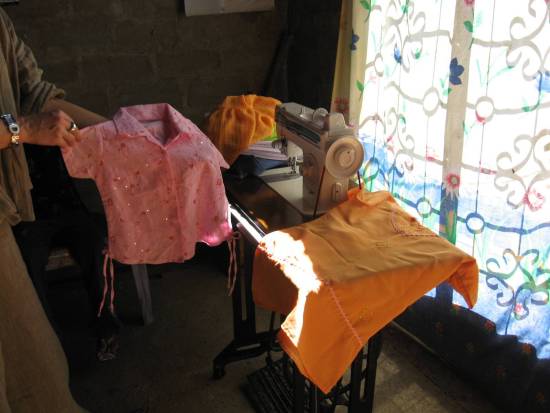 area so the CCF has paid for a sewing
machine for the family. They have already bought 8 in the district. Each of
them is worth RS30000, about €200. The family got the machine very recently so
for the moment the clothes made are for the family and the neighbours. But in a
near future the production will be sold through a kind of cooperative run by the project. Her husband
takes me to visit the field he cultivates not far from the house. We step over
tomato plants and weave between the coconut trees for a few minutes before
discovering the field in question. I am very cautious while making my way
because I don’t want to walk on a snake (cobras are numerous in this area). The
field is rather well delimited, it seems to be 3 to 4000 m2 large. They grow a
kind of very thin and very long gourd. The plants are between 1,50 and 2
area so the CCF has paid for a sewing
machine for the family. They have already bought 8 in the district. Each of
them is worth RS30000, about €200. The family got the machine very recently so
for the moment the clothes made are for the family and the neighbours. But in a
near future the production will be sold through a kind of cooperative run by the project. Her husband
takes me to visit the field he cultivates not far from the house. We step over
tomato plants and weave between the coconut trees for a few minutes before
discovering the field in question. I am very cautious while making my way
because I don’t want to walk on a snake (cobras are numerous in this area). The
field is rather well delimited, it seems to be 3 to 4000 m2 large. They grow a
kind of very thin and very long gourd. The plants are between 1,50 and 2 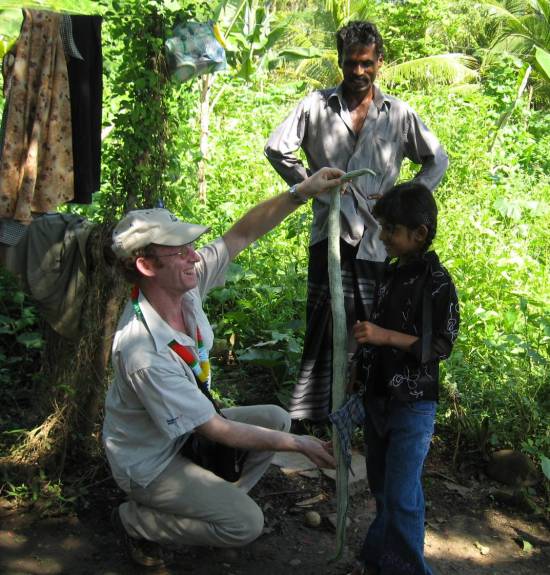 metres
high. Each visit is also the occasion to taste a bean, a fruit or a new
vegetable found by Kumara’s professional eye. He likes joking and, taking
advantage of our complete confidence in him, he makes us eat a fruit which is
surely delicious when ripe, but which is very acid when still green. He’ll fool
us again later with cloves!
metres
high. Each visit is also the occasion to taste a bean, a fruit or a new
vegetable found by Kumara’s professional eye. He likes joking and, taking
advantage of our complete confidence in him, he makes us eat a fruit which is
surely delicious when ripe, but which is very acid when still green. He’ll fool
us again later with cloves!
During these two days we appreciated
his natural sense of humour and we also showed ours. Anyway, the discovery of
these new flavours was something surprising and very pleasant. Before the
departure I had a little fear of the Sri-Lankan cooking and products. We had
bought all the medicines necessary in case of stomach or intestine troubles.
Finally everything was alright, so I put an ad: “One box of Maalox, lemon
flavour,(ends in 10/2010) and one box of Diarexyl (ends in 11/2010), completely
new, for sale”!
The following stage leads us to a
banana plantation which benefits from the irrigation programme. Next to it is ahouse inhabited by two boys aged about 10. A neighbour, rather old - I think
she’s 65 but it’s impossible to be sure with these marked faces – explains to
us that one of the two is her grandson. His parents died during the tsunami (
he was 5 or 6 at this time, about Sandeepa’s age), but he is lucky enough to
have a sponsor. The other one doesn’t have a family and was taken in by the
grandmother. Both kids live by their own in the house and are helped by the
neighbours.
We then visit a house against which
stands a hut sheltering a strange machine. I’m told that this machine is used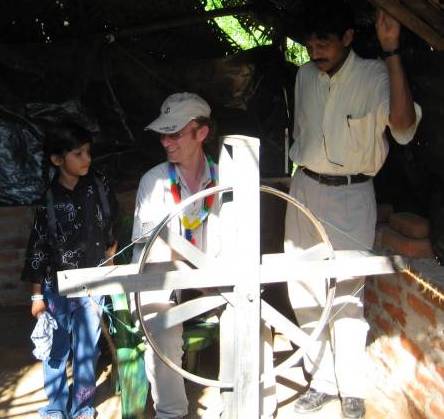 to make cords from coconut fibres. The CCF financed the machine which is very
simple and a first supply of 300 kg of coconut fibres. Thanks to that, two
women earn a small amount of money. I can’t resist to the desire of operating
the machine while the two women are weaving the coconut fibre. This spontaneous
team work makes them laugh, I take advantage of the situation to play tricks by
testing the resistance of the new rope with my Herculean strength. Kumara makes
a good audience, we continue our visit still with Sandeepa who gets
progressively used to our presence. Sometimes, when getting off the minibus or
when walking the short distances done on foot, she comes and holds my hand to
walk by my side. My heart beats a little faster then; it’s such a happiness to
live these particular moments. These
to make cords from coconut fibres. The CCF financed the machine which is very
simple and a first supply of 300 kg of coconut fibres. Thanks to that, two
women earn a small amount of money. I can’t resist to the desire of operating
the machine while the two women are weaving the coconut fibre. This spontaneous
team work makes them laugh, I take advantage of the situation to play tricks by
testing the resistance of the new rope with my Herculean strength. Kumara makes
a good audience, we continue our visit still with Sandeepa who gets
progressively used to our presence. Sometimes, when getting off the minibus or
when walking the short distances done on foot, she comes and holds my hand to
walk by my side. My heart beats a little faster then; it’s such a happiness to
live these particular moments. These 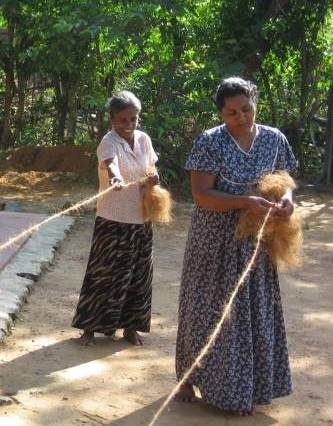 almost paternal feelings, for me who don’t
have children, are both new and
wonderful, upsetting too. I had prepared myself and I understand better the
restrictions imposed during the visits by the CCF. Besides the child’s
protection which remains an absolute priority, it’s also necessary to protect
oneself towards this relationship. Don’t let’s be carried along by our
enthusiasm, keep our place of sponsor even if there is no father, even if some
mails begin with “Dear father”, even if Sandeepa looks at me with her eyes full
of emotion, admiration and maybe of love from a little girl aged 6 who never
had a father. I wonder how Sandeepa will live our departure. I hope everything
will be alright for her; and for us.
almost paternal feelings, for me who don’t
have children, are both new and
wonderful, upsetting too. I had prepared myself and I understand better the
restrictions imposed during the visits by the CCF. Besides the child’s
protection which remains an absolute priority, it’s also necessary to protect
oneself towards this relationship. Don’t let’s be carried along by our
enthusiasm, keep our place of sponsor even if there is no father, even if some
mails begin with “Dear father”, even if Sandeepa looks at me with her eyes full
of emotion, admiration and maybe of love from a little girl aged 6 who never
had a father. I wonder how Sandeepa will live our departure. I hope everything
will be alright for her; and for us.
I ask Hemali and Kumara if it would
possible to see Sandeepa’s school. Very kindly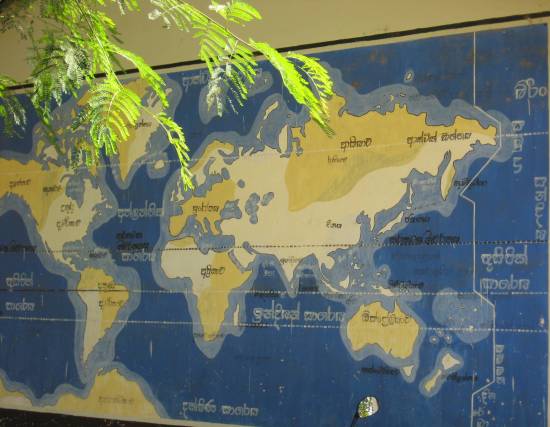 they agree to make a detour. It
wasn’t part of our plans but this nice team can’t indeed refuse us anything.
More seriously we must thank them a lot because they did everything they could
to make this visit a real success. They were always there, full of attention
and I know that organizing everything (trips, meals, visits) must have taken a
lot of time, not to mention the two days they spent with us. So we make a
little detour the school. Sandeepa is not particularly pleased for today she’s
playing truant because of us. We stay only a few minutes not to disturb the
pupils. Some of them taking advantage of their break come and meet our little
group. A huge map of the world gives me the opportunity to show them where
France and Sri Lanka are. They can thus measure
they agree to make a detour. It
wasn’t part of our plans but this nice team can’t indeed refuse us anything.
More seriously we must thank them a lot because they did everything they could
to make this visit a real success. They were always there, full of attention
and I know that organizing everything (trips, meals, visits) must have taken a
lot of time, not to mention the two days they spent with us. So we make a
little detour the school. Sandeepa is not particularly pleased for today she’s
playing truant because of us. We stay only a few minutes not to disturb the
pupils. Some of them taking advantage of their break come and meet our little
group. A huge map of the world gives me the opportunity to show them where
France and Sri Lanka are. They can thus measure 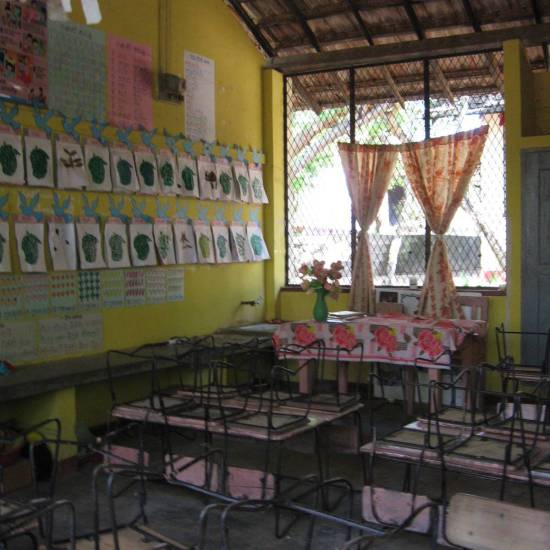 the distance between the two
countries. I’m sure they already had a good idea of the culture gap, seeing how
they watch us with their astonished eyes. The pupils in Sandeepa’s class are in
the library, we can therefore take photos of the classroom. Kumara shows me
Sandeepa’s drawing among all the ones hung on the wall.
the distance between the two
countries. I’m sure they already had a good idea of the culture gap, seeing how
they watch us with their astonished eyes. The pupils in Sandeepa’s class are in
the library, we can therefore take photos of the classroom. Kumara shows me
Sandeepa’s drawing among all the ones hung on the wall.
It’s almost time to go back to the
hotel and take Sandeepa back home. We were supposed to have a little break at
the beach but we preferred, by far, all the visits we did. At Sandeepa’home,
nobody gets off ... Munidasa and Malani
come and join us carrying bags with a mysterious contents. The minibus starts
off again, towards Kirinda beach.

Ajouter un commentaire